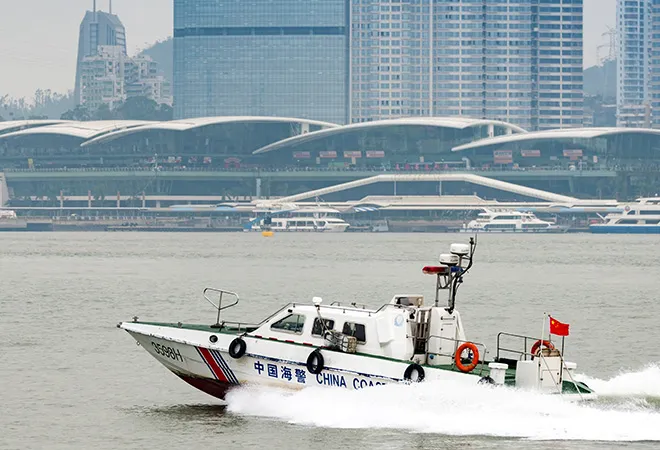-
CENTRES
Progammes & Centres
Location
Even if BRICS faces problems of consensus in the future, New Delhi will be able to concentrate on its efforts of promoting the Indian agenda.

Since its inception in 2006, BRICS has been in the observers' spotlight, gaining endorsements as well as receiving criticisms. Along with its members — Brazil, Russia, India, China and South Africa — this year, the summit will see representations by Thailand, Egypt, Tajikistan, Mexico and Guinea.
While inviting emerging economies is a practice in fostering interactions, Beijing's initiative to add new permanent members and introduce the BRICS Plus construction doesn't seem relevant in light of the recent India-China dispute.
Over the years, BRICS has managed to turn into the stable platform for developing nations' collaborative. To a large extent, implementation of a shared agenda gives reasons for an optimistic view.
BRICS has a uniting format wherein developing nations can articulate mutual approaches in global affairs.
There has always been a shared world view. However, every member state has its own set of priorities, strategic and tactical vision on several matters. When it comes to the resolution of the Syria and Afghanistan crises, Russia, India and China traditionally had higher stakes compared to Brazil and South Africa. It can also be argued that India, Brazil and South Africa are more interested in the reform of the global institutions than Russia and China.
Since its inception in 2002, the Russia-India-China trilateral forum (RIC) has managed to overcome divergences, including border incidents between India and China. RIC has helped establish regular dialogue between different foreign affairs ministers. The RIC mechanism broke down in April 2017 when China's Foreign Minister Wang Yi refused to take part in the meeting, possibly because of the Dalai Lama's visit to Arunachal Pradesh. China claims Arunachal Pradesh as part of Tibet. It is, in fact the initial point of the India-China discord, following Beijing’s decision to rename six places in Arunachal Pradesh and New Delhi’s boycott of the One Belt One Road summit, and later, the standoff in Doklam.
It is crucial to see if the current row in the Sino-Indian relationship affects the RIC — and in turn — the BRICS.
Being a leading nation in financial and military capabilities, China views itself as a hegemon. China seems to dismiss the golden rule of leadership: "With greater power comes greater responsibility." Beijing is trying to use its economic and political strength to set its rules and promote its interests. However, territorial disputes in South China Sea and at the Doklam plateau can hardly strengthen global perceptions about China. Neither Russia nor India will come to terms with a China-dominated Asia.
New Delhi is wary of China's moves in the South China Sea, in Southeast Asia and the Indian Ocean region. It is more concerned about China's activities in South Asia in context to the China-Pakistan Economic Corridor (CPEC) project. China hasn't supported India's bid at the UN Security Council and the NSG membership. However, despite negative trends in Sino-Indian relations, the two countries have managed to maintain close economic ties.
Russia finds itself in a complicated position within this continuing distrust. It is forced to balance between 'two friends'. Moscow has not spoken officially regarding the dispute between the two sides, but its foreign ministry expressed hope. It said: "s responsible members of the international community, New Delhi and Beijing will be able to find mutually acceptable ways to quickly defuse the tensions that have arisen between them."
The important factor, however, is that all the three leaders — of India, China and Russia — are likely to remain in power for the next couple of years. Even as contradictions inside the group are looming, the three countries will need to maintain their partnership, adapting their foreign policy patterns to emerging realities.
Moscow can play the apparent role of being the connecting link in the RIC mechanism. For one, India and China trust Russia as their strategic partner. Additionally, Russia is arguably the only country in the world who can have an influence on Beijing’s stance. The two states have had good relations.
IBSA (India-Brazil-South Africa tripartite grouping) is balanced in its purview: to strengthen the South-South cooperation. While the group comprises three multi-ethnic, multicultural, multireligious democracies whose strategic interests do not contradict, India, Brazil and South Africa share common goals in the global governance system.
Since the first trilateral meeting in 2003, IBSA has failed to become an institutionalised platform. The meetings of the countries' representatives are irregular and often coincide with BRICS and UNGA events. The last summit of the three nations' leaders took place in South Africa in 2011, and since then, the summit, planned to be held in India in 2013, was cancelled due to 'scheduling issues'. It is still not clear whether the meeting, announced to take place in mid-2017, will go ahead.
The three nations established joint naval exercises — the IBSAMAR. At the same time, developments in military understanding and interoperability between IBSA members indicate immense potential. Being a member of both distinct platforms, India holds a preferable position, having the scope to pursue interests in BRICS, RIC and IBSA. Even if BRICS faces problems of consensus in the future, New Delhi will be able to concentrate on its efforts promoting the Indian agenda.
Being a member of both distinct platforms, India holds a preferable position, having the scope to pursue interests in BRICS, RIC and IBSA.
It is evident that BRICS has hardly represented a united political force so far and the strategic interests of its members are increasingly falling apart. The group should concentrate on fostering geo-economic cooperation, primarily on developing competitive financial institutions, increasing market integration and implementing infrastructure projects. It will be difficult to avoid the issues of finding mutually beneficial solutions; for instance, on the Chinese Belt Road Initiative (BRI). However, the commitment to the idea of the multipolar world with strong and independent governance institutions that created the group, can help mitigate diverging views.
To move to the second golden decade, BRICS indeed needs to build on the achievements of the past, but also retain the legacy of the format and return to its origins.
The author is a visiting fellow at ORF New Delhi.
The views expressed above belong to the author(s). ORF research and analyses now available on Telegram! Click here to access our curated content — blogs, longforms and interviews.

Aleksei Zakharov is a Fellow with ORF’s Strategic Studies Programme. His research focuses on the geopolitics and geo-economics of Eurasia and the Indo-Pacific, with particular ...
Read More +